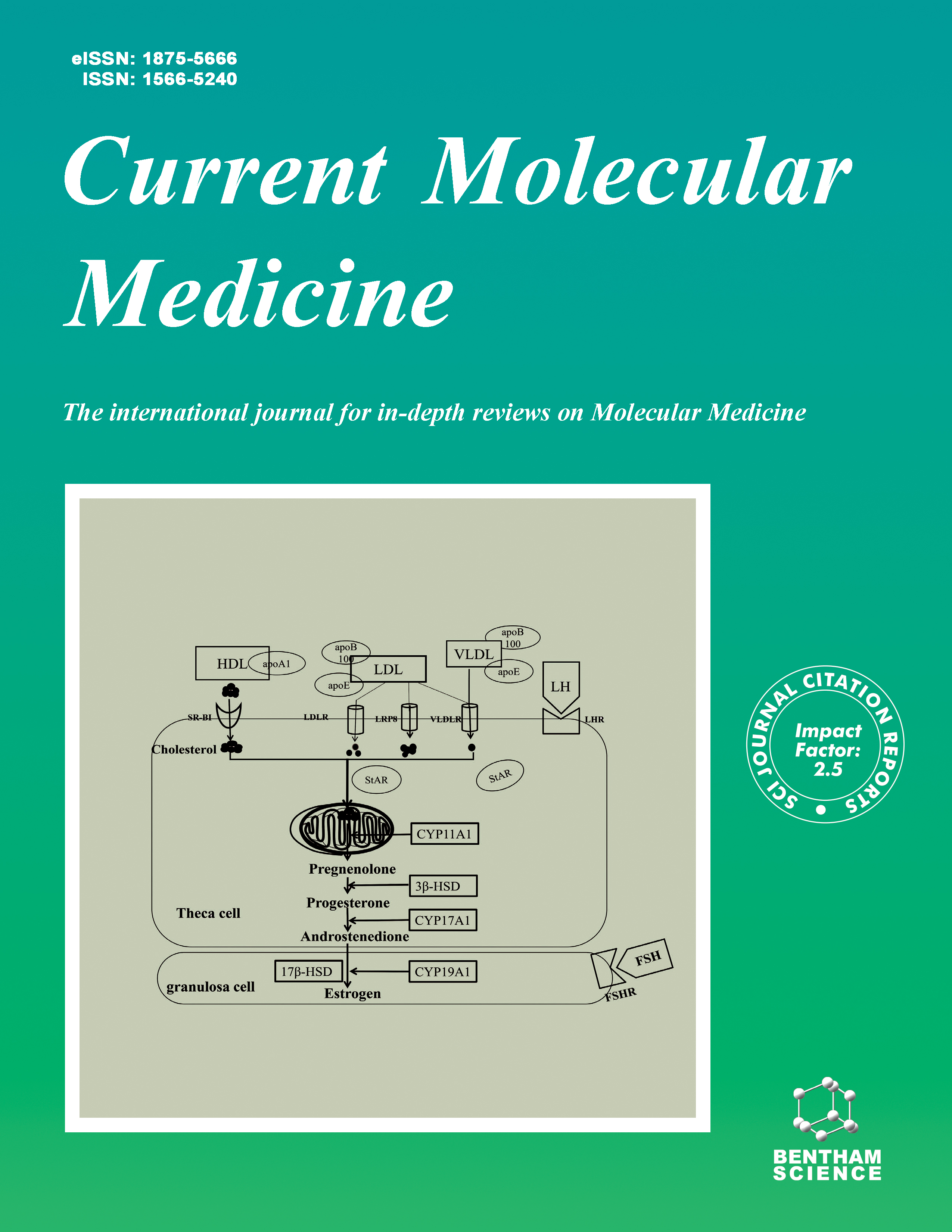- Home
- A-Z Publications
- Current Molecular Medicine
- Previous Issues
- Volume 9, Issue 1, 2009
Current Molecular Medicine - Volume 9, Issue 1, 2009
Volume 9, Issue 1, 2009
-
-
Editorial [Hot Topic: Innate Immunity and Autoimmune Disease (Guest Editors: F. Susan Wong and Li Wen)]
More LessAuthors: F. S. Wong and Li WenThe immune system provides a vital protective system for living organisms from infection. Most organisms from the simplest to the most complex have some form of innate immune system, to provide the relatively non-specific early response against invasion of pathogens. Apart from the physical barriers to infection, the non-specific enzymes such as lysozyme in tears and saliva and anti-bacterial peptides that include defe Read More
-
-
-
Natural Killer T Cells and Autoimmune Disease
More LessAuthors: Lan Wu and Luc V. KaerNatural killer T (NKT) cells are an unusual subset of innate immune cells that express a surface receptor generated by somatic DNA rearrangement, a hallmark of cells of the adaptive immune system. NKT cells express a highly restricted repertoire of T cell receptors that recognize glycolipid antigens bound with the antigen-presenting molecule CD1d. A hallmark of NKT cells is their capacity to produce copi Read More
-
-
-
The Contribution of γδ T Cells to the Pathogenesis of EAE and MS
More LessAuthors: Sarah E. Blink and Stephen D. Millerγδ T cells are a multifaceted group of cells which have both innate and adaptive characteristics and functions. Although they are most commonly known for their response to mycobacterium and their locations at mucosal sites, their roles in autoimmunity are still unclear. γδ T cells have been seen in the CSF and lesions of Multiple Sclerosis patients and although their function is not entirely understood, it is clear these cells may Read More
-
-
-
Monocyte Dependent Regulation of Autoimmune Inflammation
More LessAuthors: Lindsay B. Nicholson, Ben J.E. Raveney and Markus MunderIn chronic inflammation, across a number of quite different pathological conditions, monocytes accumulate. In autoimmune disease, these cells are widely recognised to play an inflammatory and tissue destructive role. But these cells also inhibit T cell proliferation by a range of different mechanisms that are accompanied by the depletion of specific amino acids in the local microenvironment and the downregulation of th Read More
-
-
-
Role of Innate Immunity in Triggering and Tuning of Autoimmune Diabetes
More LessAuthors: Hun S. Kim and Myung-Shik LeeType 1 diabetes (T1D) is an organ-specific autoimmune disease resulting from the specific destruction of insulin-producing pancreatic β-cells, culminating in a state of hypoinsulinemia and hyperglycemia. Pathogenesis of T1D comprises complex series of events from the initial sensitization of antigen-presenting cells (APCs) to β-cell antigens to almost total insulin deficiency due to islet destruction. Although it is established th Read More
-
-
-
Innate Immunity and Primary Biliary Cirrhosis
More LessAuthors: Carlo Selmi, Ana Lleo, Simone Pasini, Massimo Zuin and M. E. GershwinThere has been a rapid growth in our understanding of the molecular bases of primary biliary cirrhosis (PBC). These efforts were initiated when the immunodominant mitochondrial autoantigen was cloned and sequenced. Using the recombinant cloned antigen as a tool, research has focused on the effector mechanisms of disease and the uniqueness of the primary target tissue, the intrahepatic bile ducts. Most recently, there ha Read More
-
-
-
The Role of Toll-Like Receptor Pathways in the Mechanism of Type 1 Diabetes
More LessAuthors: Egil Lien and Danny ZiprisToll-like receptors (TLRs) and the innate immune system play a key role in sensing and eliminating microbial infections. Interactions between TLRs and their ligands expressed by microbial pathogens induce a cascade of intracellular signaling events, culminating in the upregulation of proinflammatory pathways. Over the past two decades, numerous studies have established the role of the acquired immune system in t Read More
-
-
-
Tyrosine Kinases and Inflammatory Signalling
More LessAuthors: Theresa H. Page, Maria Smolinska, Justin Gillespie, Anna M. Urbaniak and Brian M.J. FoxwellThe activity of tyrosine kinases is central to many cellular processes, and accumulating evidence suggests that their role in inflammation is no less profound. Three main tyrosine kinase families, the Src, Tec and Syk kinase families are intimately involved in TLR signalling, the critical first step in cellular recognition of invading pathogens and tissue damage. Their activity results in changes in gene expression in affected cells. Key a Read More
-
-
-
Atypical Chemokine Receptors in Inflammatory Disease
More LessAuthors: Manish Patel, Iain B. McInnes and Gerard GrahamThere is considerable interest in the therapeutic utility of inhibiting cellular trafficking in a variety of inflammatory diseases. Approaches including inhibition of adhesion molecule function and in particular of chemokine effector function have met with high levels of success in many models of disease but have been of less value in application to clinical disease states. Although this may in part be explained by pharmacokinetic a Read More
-
Volumes & issues
-
Volume 25 (2025)
-
Volume 24 (2024)
-
Volume 23 (2023)
-
Volume 22 (2022)
-
Volume 21 (2021)
-
Volume 20 (2020)
-
Volume 19 (2019)
-
Volume 18 (2018)
-
Volume 17 (2017)
-
Volume 16 (2016)
-
Volume 15 (2015)
-
Volume 14 (2014)
-
Volume 13 (2013)
-
Volume 12 (2012)
-
Volume 11 (2011)
-
Volume 10 (2010)
-
Volume 9 (2009)
-
Volume 8 (2008)
-
Volume 7 (2007)
-
Volume 6 (2006)
-
Volume 5 (2005)
-
Volume 4 (2004)
-
Volume 3 (2003)
-
Volume 2 (2002)
-
Volume 1 (2001)
Most Read This Month
Article
content/journals/cmm
Journal
10
5
false
en


